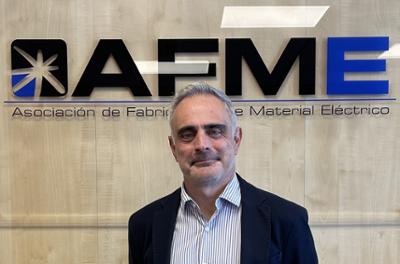

Álex Burgalés (AFME): MATELEC boosts collaborations and networking
Álex Burgalés, secretary general of AFME (Association of Electrical Material Manufacturers), states in the following interview that the process of electrification in our societies is leading to electrical mobility, the promotion of renewable energy sources and energy efficiency becoming increasingly important. He also explains that MATELEC is "a meeting point for the sector that facilitates contact not only between suppliers and customers, but also between colleagues, which boosts collaboration and networking".
How has the electrical equipment manufacturing industry in Spain evolved in recent years?
In the three years prior to the pandemic we experienced good levels of growth, but in 2020 COVID-19 led to a 12.4% drop in sales. This drop was quite reasonable, given the circumstances, partly because we are considered an essential sector and our activity was not impacted as significantly. In 2021 we quickly regained the ground lost in 2020, and in 2022 we experienced notable growth of 10%. These were two good years, but with ups and downs and various issues to deal with, such as supply problems and inflation.
2023 was a year characterised by adjustment in our sector, with a growth of only 1.63%. This downturn was due to the regularisation of the overstocks of our companies' customers, caused by the uncertainty due to the supply problems in the post-COVID-19 recovery phase and the poor performance of sectors such as construction and home refurbishment, or solar self-consumption. In terms of the latter sector, it is worth mentioning that new PV self-consumption installations fell by 32% compared to 2022, which was most notable in residential self-consumption (-54%). However, it should be mentioned that the "bad" 2023 figure is still 42% higher than that of 2021.
Following a weak start to 2024, we expect to rebound from the second half of the year onwards, ending the year with growth of between 2% and 4%.
What are the main challenges the industry is currently facing?
The process of electrification of our societies is leading to a growing importance in electric mobility, the promotion of renewable energy sources and energy efficiency. All of this works in our favour as a sector. But some of these aspects, such as the adoption of the use of electric vehicles, are not evolving as fast as we would hope. Adapting to a demand evolution that will by no means be free of ups and downs poses a significant challenge.
As a sector we must work to make visible the importance of the rehabilitation of electrical installations in our country, as well as to adapt to the increasingly demanding environmental regulations. Digital transformation, which essentially impacts every aspect of business and is becoming increasingly complex with the emergence of Artificial Intelligence, is also a challenge to be taken into consideration. Finally, there are cross-cutting issues that affect all sectors, such as difficulties in talent acquisition or increasing absenteeism at work. At AFME, we offer our companies services designed to help them face these challenges.
Alongside all these challenges, what new trends are being detected in the sector?
Solutions related to energy transition, digitalisation or services are becoming increasingly important. To give just a couple of examples, in recent years the number of companies in the sector that have added chargers for electric vehicles to their offer has grown significantly, as well as providing an opportunity for the creation of new companies, which is by no means easy in a mature market like ours. The number of AFME companies that have adapted their offer to enhance their connection with renewable energies has also seen growth each year.
How is their participation in MATELEC 2024 important for AFME?
MATELEC and AFME were founded 42 years ago and we have worked hand-in-hand from the very beginning, so logically it is a very close relationship and the event is very important, both for us and for the sector. The forum provides a space where we can meet our partners, present our innovations to the sector or organise all kinds of actions that bring us closer to the market.
How do you think this fair contributes to the boosting of the sector and the dynamisation of commercial proposals?
MATELEC serves as a meeting point for the sector that facilitates contact not only between suppliers and customers, but also between colleagues, which fosters collaborations and networking. Trade fairs continue to be a very suitable instrument for the presentation of new products. And, from the visitor's perspective, although there are other tools, few experiences are better than being able to see the trends in the sector in just a few hours and talk directly to a large number of manufacturers. Additionally, the programme of conferences, awards and other events that form part of the fair help to emphasise the aspects that are dynamising and transforming the sector.
Would you like to highlight any of the association’s projects in particular?
The Observatory for the Electrical Rehabilitation of Housing in Spain (OREVE) was launched recently. This project is promoted by sectoral organisations, professional associations and entities linked to the energy transition and the electrification of society. The OREVE aims to analyse the state of electrical installations in Spanish homes and their adaptation and rehabilitation needs in order to incorporate the necessary technologies to address decarbonisation. The adoption of energy-efficient technological solutions, electric vehicles, self-consumption and home storage require the property to have an up-to-date, equipped, efficient and safe electrical installation.
The Observatory will work to obtain information and share knowledge on the electrical upgrading of properties and homes in Spain, within the framework of comprehensive renovation, and to raise awareness of the role of electrical installations in decarbonisation and the energy transition in the face of the climate crisis, as well as to improve their safety.
The promotion of the integral rehabilitation of housing, promoted by public administrations taking advantage of European aid, is a unique opportunity to also make progress in the rehabilitation of electrical installations. Spain has more than 26 million properties, 80% of which date back to before 2002, when the Low Voltage Electrotechnical Regulations were approved, and 43% were built between 1980 and 2006, when the Technical Building Code was approved. These data point to the need to incorporate the upgrading of electrical installations into the rehabilitation effort within the framework of comprehensive rehabilitation. For this reason, the OREVE wants to create mechanisms to quantify and assess the convenience of this unique opportunity to have a safe and prepared housing stock for the energy transition and to achieve the PNIEC targets of CO2 neutrality in housing by 2050.





